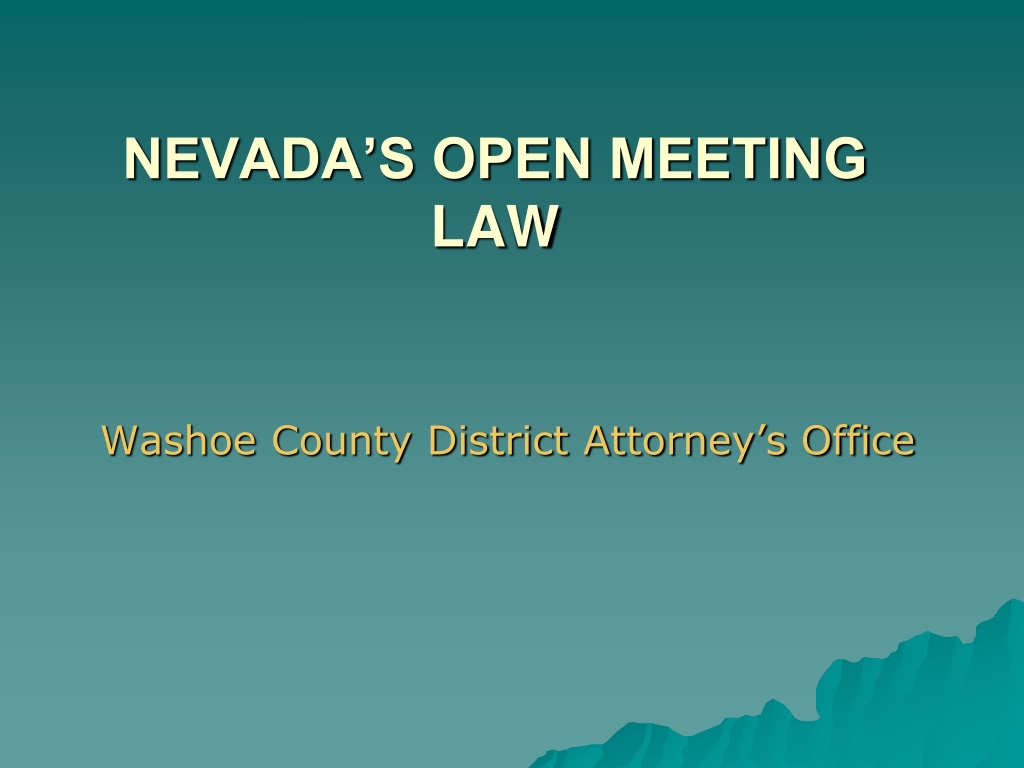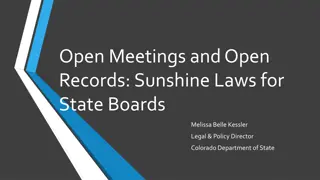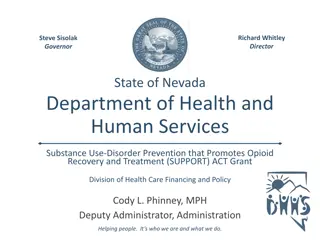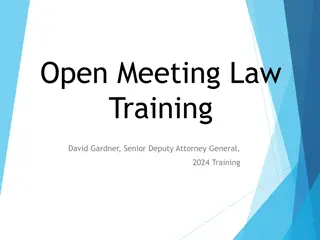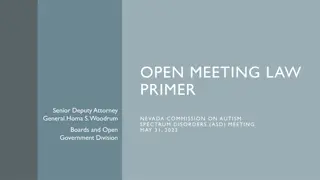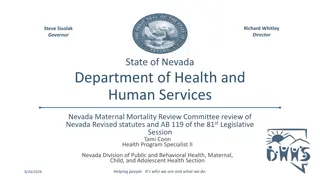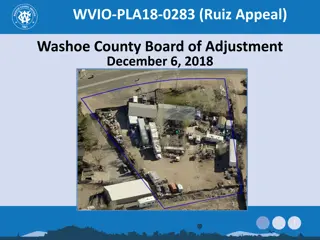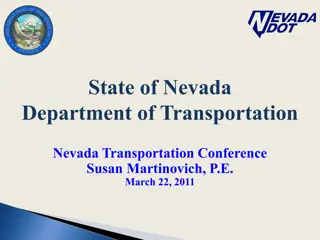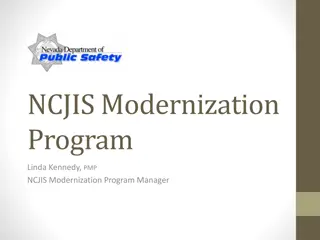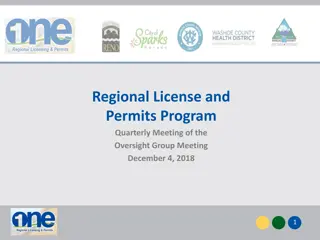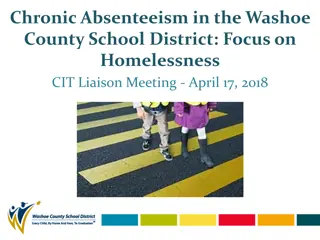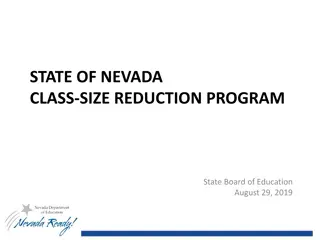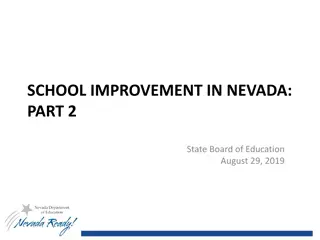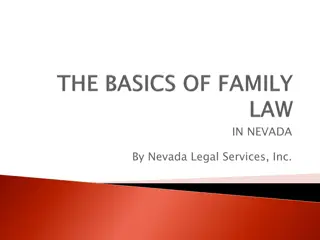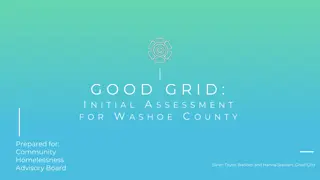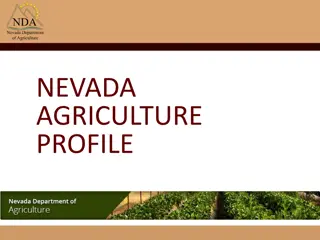Understanding Nevada's Open Meeting Law (OML) in Washoe County
Nevada's Open Meeting Law (OML) ensures that the deliberations and actions of public bodies are conducted openly in order to aid in the conduct of the people's business. The law applies to all meetings where deliberation or action may occur. Public bodies covered by OML include boards, commissions, committees, and other entities supported by tax revenue. OML sets out requirements for public body meetings, including notice, agenda, and minutes. The law also allows for meetings to be held in person, via remote technology systems, or in a hybrid format, with specific guidelines for public participation.
Download Presentation

Please find below an Image/Link to download the presentation.
The content on the website is provided AS IS for your information and personal use only. It may not be sold, licensed, or shared on other websites without obtaining consent from the author. Download presentation by click this link. If you encounter any issues during the download, it is possible that the publisher has removed the file from their server.
E N D
Presentation Transcript
NEVADAS OPEN MEETING LAW Washoe County District Attorney s Office
Legislative Intent of OML NRS 241.010 sets forth a legislative declaration: Public bodies exist to aid in the conduct of the people s business. It is the intent of the OML that board deliberations and board actions be conducted openly.
When Does the OML Apply? In general, OML applies to all meetings of a public body at which deliberation takes place and/or action may occur.
Pillars of the OML Public Body Meeting Notice Agenda Minutes AB 253 (2021): No major revisions However, AB 253 put some structure around remote technology meetings
Public Body NRS 241.015(4) Any administrative, advisory, executive or legislative body of the state or local government which expends or disburses or is supported in whole or in part by tax revenue or which advises or makes recommendations to an entity which expends or disburses or is supported in whole or in part by tax revenue includes any board, commission, committee, subcommittee or other subsidiary thereof
Meeting NRS 241.015(3)(a)(1) In general, a meeting is: The gathering of members of a public body at which a quorum is present to deliberate toward a decision or to take action on any matter over which the public body has supervision, control, jurisdiction or advisory power.
What is a Quorum? NRS 241.015(5) A simple majority of the public body s membership Or another proportion as required by specific statute
Methods of Holding Meetings If properly noticed and open to the public, meetings may be held: In person Via remote technology system (teleconference or videoconference) Hybrid (both in person & remote option) Exception: If public body comprised of all elected officials, need physical meeting space Qualification: If using remote technology system only, the public must be able to hear/observe the meeting, provide live public comment during the meeting & have option to attend meeting via telephone (requires web-based link + phone number)
Special Note Serial Electronic communication must not be used to circumvent the spirit or letter of the Open Meeting Law (NRS 241.016(4)) So be careful when communicating over email
Watch Out for Walking Quorum NRS 241.015(3)(a)(2) If a public body s members engage in a series of gatherings at which: (I) Less than a quorum is present at any individual gathering; (II) But, the members of the public body attending one or more of the gatherings collectively constitute a quorum; and (III) The series of gatherings was held with the specific intent to avoid the OML= OML violation
Exception: Attorney-Client Communications Quorum of board members may gather to: Receive information from the public body s attorney regarding potential or existing litigation, and to deliberate toward a decision= NOT a meeting (NRS 241.015(3)(b)(2)) Receive training from the public body s attorney regarding legal obligations, if public body does NOT deliberate toward a decision= NOT a meeting E-mail communication with the board s attorney= generally NOT a meeting - But do not hit Reply All
Exception: Social Function NRS 241.015(3)(b)(1) Even if a quorum is present, social functions are NOT meetings, as long as the members do not deliberate toward a decision or take action on any matter over which the public body has supervision, control, jurisdiction or advisory power. Don t turn a party into a meeting!!
Notice of Meeting NRS 241.020 Content Day, Time, Location (include room) If a meeting location is offered, must make reasonable efforts to ensure meeting location is large enough to accommodate anticipated number of attendees. (Capacity limits O.K.) If meeting held using remote technology system ONLY: How public can use system to hear/observe meeting How public can participate in meeting via telephone How public can provide live public comment (and if authorized by public body, pre-recorded public comment) List of locations where notice posted Contact info (including business address) for person who can provide supporting materials Means of providing public comment (options) Agenda
Notice of Meeting cont NRS 241.020 Posting Principal office of public body + 3 prominent places (No longer a requirement) Websites (public body website (if there is one) & state noticing website)) Additional requirement for Remote Technology meetings only: Public body MUST have website & post notice, supporting materials to the website. Mailing Subscription- mail or email 3 Working Days prior to meeting (by 9 a.m.)
Agenda NRS 241.020 Clear and Complete statement of topics to be considered (stringent standard) Could your neighbor understand what is going to happen at the meeting? Notation For Possible Action if action item Informational Discussion Deliberation Collectively examining, weighing and reflecting upon the reasons for or against an action. Includes collective exchange of facts preliminary to ultimate decision. Action Decision, commitment or promise, affirmative vote
Agenda cont NRS 241.020 Public Comment Periods Block of time at beginning and end of meeting; or During each action item (After public body has discussed item, but before public body has taken any action on that item) Cannot restrict a speaker s viewpoint However, conduct that disrupts the meeting s order, efficiency or safety may be limited Board cannot deliberate or take action in response to public comment, unless item is already on the agenda Notice that agenda items may be: Taken out of order Combined Removed or delayed discussion
Materials Available to the Public Agenda Supporting Materials Must be posted on public body s website Upon being available to the public body supporting materials must be made available to the public. Can be before meeting or on the day of the meeting If on day of meeting, post to website within 24 hours Can be made available by e-mail or emailed link if the requester approves
ActionVoting Minimums If a public body may have a member who is not an elected official, an affirmative vote taken by a majority of the members present during a meeting of the public body NRS 241.015(1)(c) If all the members of a public body are elected officials, an affirmative vote taken by a majority of all the members of the public body NRS 241.015(1)(d)
Minutes NRS 241.035 Minutes must contain: Date, time, location of meeting Members present Substance of all matters discussed or decided Remarks made by member of public (if person requests minutes reflect remarks) Meetings must be audio-recorded or transcribed by certified court reporter. Recordings retained for 3 years. Minutes must be available within 30 working days after meeting. Can post draft minutes on website prior to approval. Retained for 5 years. Approved w/in 45 days or at the next meeting (whichever later)
Corrective Action If an OML violation occurs, the public body may take corrective action within 30 days If appropriate corrective action taken, Attorney General s Office may elect not to prosecute the OML violation.
Enforcement Person may make OML complaint to Nevada Attorney General s Office AG notifies public body of complaint w/in 14 days If complaint submitted w/in 120 days of alleged violation, AG MUST investigate. If complaint submitted after 120 days, AG will NOT investigate Exception: Alleged violation not previously discoverable & complaint submitted w/in 1 year. AG not required to investigate an alleged OML violation if person s interests are not significantly affected by alleged violation. Example: Person doesn t live within public body s geographic area
Enforcement, cont If AG conducts investigation, it will inform public body After investigation complete, AG will issue: A finding that NO violation occurred; OR A finding that a violation occurred + an explanation for this finding Public body submits response w/in 30 days If AG finds an OML violation, public body must acknowledge finding on next agenda
OML Violations AG may bring a legal proceeding to void an action taken in violation of the Open Meeting Law; or to obtain an injunction to prevent violations of the Open Meeting Law A private citizen may also bring a legal proceeding
OML Violations Action taken in violation of the Open Meeting Law is void - NRS 241.036 OML violations may result in administrative fines against board members 1st offense: $500; 2nd: $1,000; 3rd: $2,500 Serious violations of the OML (member has knowledge of violation & participates in violation) can result in misdemeanor charges However, if a board member violates the OML because the board member is relying on legal advice of board counsel= no administrative fine or criminal penalty.
Advice Don t assume that other public body members will be able to spot every issue! Discuss any questions/issues with legal counsel
Sources of Information NRS Chapter 241 Open Meeting Law Manual published by the Attorney General s Office Available online at http://ag.state.nv.us Opinions from the Attorney General s Office relating to the OML Available online at http://ag.state.nv.us
